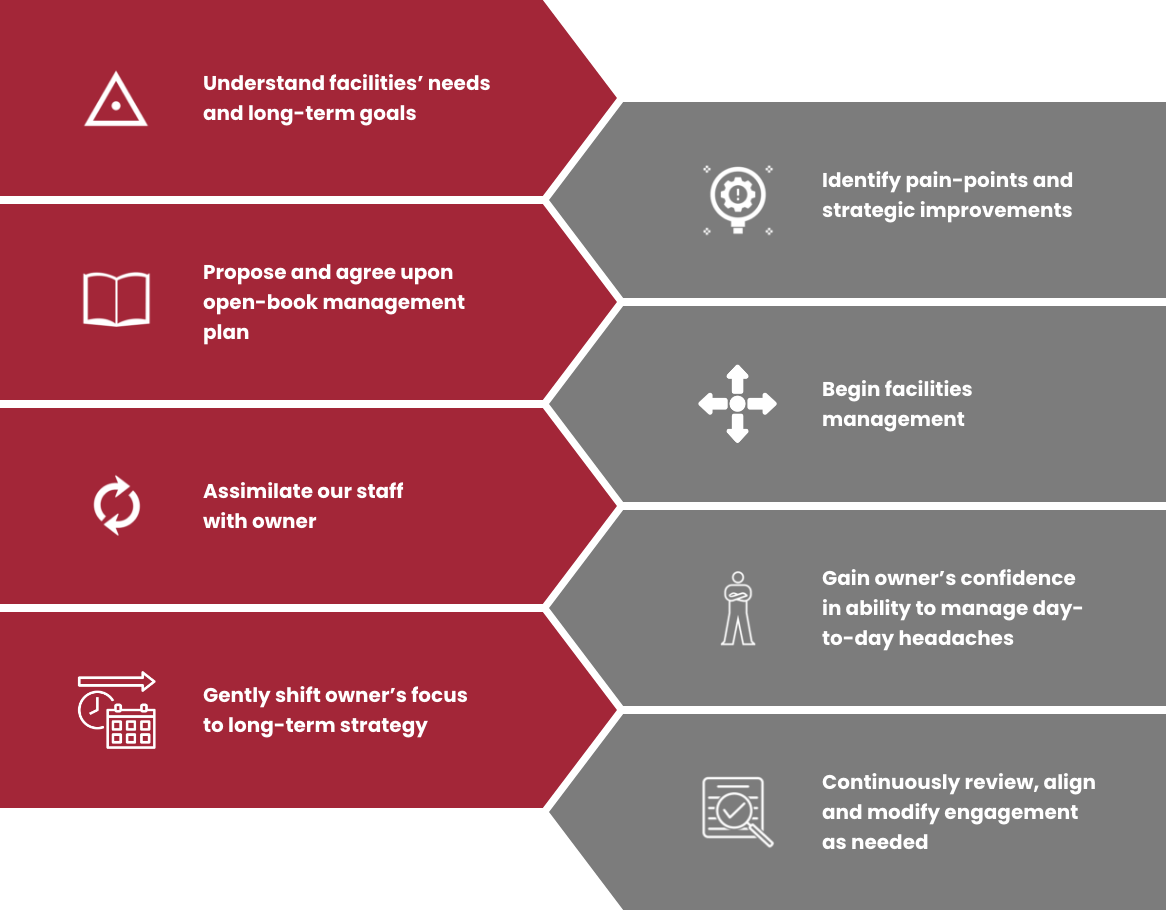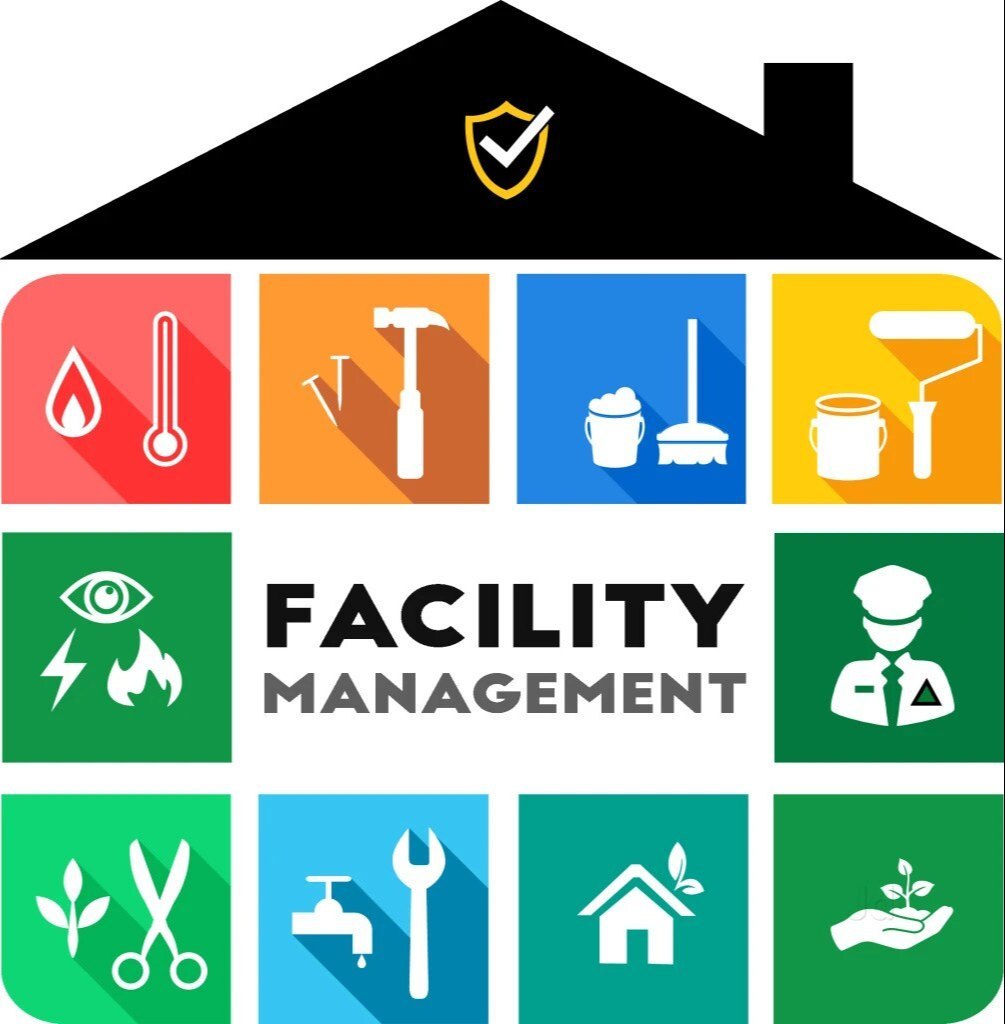Ideal Practices in Facility Management for Modern Organizations
Ideal Practices in Facility Management for Modern Organizations
Blog Article
Key Patterns Shaping the Future of Facility Management in 2024
As we look ahead to 2024, the landscape of center monitoring is positioned for considerable change, driven by several key trends. The integration of clever building technologies and a change towards data-driven decision-making promise to enhance functional effectiveness while prioritizing sustainability in technique.
Smart Building Technologies

Smart building innovations encompass a vast variety of systems, consisting of smart lights, a/c controls, and protection systems. By incorporating these systems, facility managers can keep track of and change specifications in real-time, causing significant reductions in energy waste and operational costs. Wise sensing units can detect occupancy degrees and change illumination and temperature as necessary, making certain that power is only used when necessary.
In addition, these innovations assist in enhanced data collection, permitting companies to track usage patterns and determine chances for further renovations. The execution of wise building technologies not only adds to sustainability objectives however also develops healthier workplace that can increase staff member efficiency and fulfillment.
As we move into 2024, the fostering of wise building modern technologies will likely speed up, mirroring a broader change towards even more intelligent, receptive, and sustainable facility monitoring practices.
Data-Driven Choice Making
Increasingly, companies are leveraging data-driven choice making to boost facility administration practices. By taking advantage of data analytics, center supervisors can acquire actionable understandings that dramatically enhance operational effectiveness and source allowance. The integration of sophisticated modern technologies, such as IoT sensors and real-time surveillance systems, enables the collection of huge amounts of information on building performance, occupancy prices, and power consumption.
This riches of details permits facility supervisors to recognize trends, anticipate upkeep requirements, and proactively address concerns before they escalate. For circumstances, anticipating analytics can forecast tools failures, decreasing downtime and fixing costs. Additionally, data visualization tools facilitate much better interaction amongst stakeholders, making certain that informed choices are made collaboratively.
Furthermore, data-driven techniques boost tactical planning by allowing facility managers to evaluate the efficiency of present methods and make notified options regarding investments in innovation or facilities. As organizations increasingly prioritize functional quality, data-driven decision making is poised to become a cornerstone of successful facility management techniques in 2024 and beyond. Ultimately, the ability to leverage data properly will equip organizations to create a lot more effective, effective, and resilient facilities.
Sustainability and Green Practices
The emphasis on data-driven decision making naturally straightens with the expanding concentrate on sustainability and green methods within center administration. As organizations significantly focus on environmental responsibility, facility supervisors are leveraging analytics to maximize resource use, minimize waste, and reduce carbon impacts. This critical strategy allows the integration of energy-efficient systems, such as LED lights, wise cooling and heating controls, and renewable resource resources into facility procedures.
In addition, the execution of sustainable techniques extends beyond power consumption. Center managers are promoting and embracing eco-friendly products recycling initiatives to develop a circular economic situation within their facilities. This not just enhances the environmental account of the organization however also promotes a society of sustainability among staff members.
Compliance with environmental guidelines is an additional vital facet driving the fostering of environment-friendly methods. By making use of data analytics, facility supervisors can monitor conformity metrics and recognize areas for enhancement, making certain adherence to global and regional sustainability standards.
Hybrid Work Designs
A significant shift towards hybrid job versions is improving the landscape of facility administration in 2024. This standard incorporates remote and in-office work, requiring a reevaluation of area utilization, resource allotment, and worker interaction approaches. Organizations are significantly recognizing the importance of flexible work areas that cater to diverse requirements and preferences.
Center managers have to adapt by applying versatile workplace designs that sustain collaborative efforts while giving locations for focused job. This includes the combination of modern technology to help with smooth interaction and partnership amongst remote and in-office workers. Smart structure solutions, geared up with sensing units and analytics, enable for real-time surveillance of space usage, making it possible for companies to enhance informative post their settings successfully.
Furthermore, crossbreed job versions emphasize the requirement for efficient center management that prioritizes worker experience. This encompasses not just modern technology and room design however likewise the advancement of plans that advertise a well balanced work-life dynamic. As companies navigate this transition, the function of facility administration ends up being essential in developing a dexterous workplace that cultivates productivity and drives organizational success. Essentially, the hybrid work model is transforming center administration, motivating a positive technique to satisfy the progressing demands of the workforce.
Improved Occupant Health
As organizations accept hybrid work versions, an increased focus on occupant health is becoming essential to facility management strategies. read this article Facility Management. This change acknowledges that a healthy and satisfied labor force straight impacts performance and retention prices. Facility supervisors are now focusing on atmospheres that promote mental and physical wellness, integrating components such as natural lights, biophilic style, and obtainable wellness sources

Modern technology plays a critical role in this evolution. Smart building systems can monitor ecological elements and readjust settings in real-time, guaranteeing ideal comfort levels - Facility Management. Furthermore, feedback devices, such as tenancy sensing units and employee surveys, allow center supervisors to continuously fine-tune wellness efforts based on occupant demands.

Final Thought
In 2024, the future of center administration will certainly be considerably affected by the assimilation of wise building innovations and data-driven decision-making, cultivating improved operational efficiency. Sustainability initiatives will certainly prioritize environment-friendly practices, while the development of crossbreed work designs will demand versatile office styles. A heightened focus on resident wellness with sophisticated A/c systems and biophilic layout will certainly add to much healthier job settings. These trends collectively underscore the developing landscape of facility management in response to contemporary challenges and opportunities.
Center supervisors are advertising and embracing environment-friendly materials recycling campaigns to develop a circular economy within their centers.A substantial shift towards crossbreed work models is reshaping the landscape of facility monitoring in 2024.In addition, hybrid have a peek here work versions highlight the requirement for effective center administration that prioritizes staff member experience.As organizations welcome hybrid work versions, an increased focus on owner wellness is coming to be important to facility administration strategies.In 2024, the future of center management will certainly be substantially affected by the combination of wise building modern technologies and data-driven decision-making, promoting boosted operational performance.
Report this page